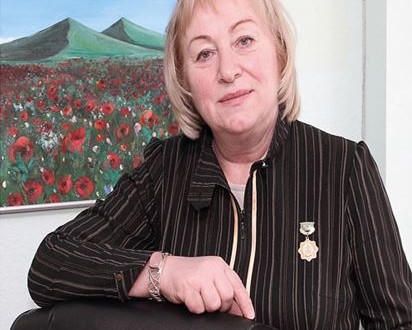News from the inside
Chairman of the Cultural Society of Narva Tatars Maryam Malysheva was awarded the medal of the World Congress of Tatars “For great services to the Tatar people.” The award ceremony was held in Kazan, at the expanded meeting of the World Congress of Tatars and the Business Forum at the end of last year. Moreover, M. Malysheva was invited to the Congress as one of the speakers and Maryam recognized that she did not expect that her surname would sound more, in another list – rewarding one.
– I do not want to sound corny, but the medal handed to me, I see as a sign of gratitude addressed to all the Tatars living in Narva and Ida-Virumaa county and in Estonia as a whole, who remember their homeland, actively strengthen ties with compatriots, support national traditions, – says Maryam Malysheva.
Among the national-cultural societies in Narva, the Tatars community – the oldest. 27 years ago, in 1989, it was organized on the basis of the Tatar Diaspora. On account of this organization, carrying out many vivid and memorable events citywide. In 2012, by the decision of the “round table” of Tatars in the Baltic region, which is supported by the World Congress of Tatars, in Narva the VIII Baltic Sabantui was held. Estonia was first time a mistress of this holiday. And, as they say, the main ringleaders for Sabantui of international level were Narva Tatars. In the opinion of many guests, it was all done on a very decent level.
Today Narva Tatar cultural society numbers a little more than 80 members.
– I must say, Tatar Diaspora was quite large in the days of the bourgeois Estonia. Mostly, Tatars lived in Tallinn, Pärnu, Narva, among them there were a lot of merchants and artisans. In Narva, for example, near the Alexander’s Cathedral there was once a mosque, which was built on the money of Narva Muslims, and madrassa worked. After 1940 many Estonian Tatars left the country and went to Finland – says Maryam. – But in 1948, more than 300 Tatar families – almost all of the old village Andreevka of the Nizhny Novgorod region (just imagine, this village is 403 years old!) came to Estoniya. The reason for the mass “exodus” of the legendary Andreevka was that after the war began requisitioning in the countryside, and people just fled from hunger. Most Tatars settled in Tallinn, Maardu and Narva, where then large industrial construction projects started. We thought to linger in Estonia for a year or two, but it turned out that many have stayed here forever.
Who is who
Among these Tatars was also the 21-year-old young woman Alia, who had come to Narva with eighteen months old son and two teenage sisters – mother of Marym.
– I was born in Narva, but we lived in Ivangorod, in the so-called Tatar Slobodka – Maryam Malysheva says. – Before entering school, I did not speak Russian, only Tatar language. Of course, they stayed me down for a second year. But great thanks to my first teacher Nina Ivanovna, who worked all summer with me in Russian, and in September I was sent to the second grade. I studied then only good and excellent.
Maryam Malysheva graduated from the Faculty of Economics of the Tallinn University of Technology, and then another, Tallinn Pedagogical. She worked at the school, trade management, and then I got the party assignment – to improve the quality of food in canteens of Baltic Power Plant, Narva plant of building materials and Narva tanning. “Although the public power supply, I had nothing to do” – says Maryam. But I have handled with the task. Yes, so well that even received a Diploma of the Presidium of the Supreme Council of the ESSR for the quality of cooking. For many years M.A. Malysheva worked in Narva trade school.
– The Narva Tatar cultural society, I came since its inception, but I confess that at first was not an activist. Just helping Rashid Izmailov, its first chairman, in some cases, such as to make the charter of the organization – Maryam Malyshevs says. – But all around me were interesting and sincere people, with time, I felt that they – home to me in spirit, found that many things we want to and can do, there was a responsibility to the younger generation, to whom we are obliged to pass on what has been accumulated by our ancestors. And now I just can not imagine myself without this activity.
Three years ago, Mary Malysheva participated in a founding congress in Brussels, which brought together 55 delegates – representatives of the Tatar Diaspora from 18 countries of the European Union; the Alliance of Tatars Europe has been created. (By the way, now these associations on a national basis are present in 17 EU countries.) Board of the Alliance included one representative from each EU country where the Tatar societies are represented. Maryam Malysheva, Chairman of the Tatar Cultural Society of Narva, entered the European Alliance of Tatars board from Estonia and auditing commission of the organization.
– the Alliance has been established to unite the young generation of Tatars living abroad, – says Maryam Malysheva. – And, it seems, there are first fruits: a unified database of email addresses, began to operate, free online courses in the Tatar language (such as our Estonian keeleklikk), on March 15 in Stockholm to host a forum of Tatar youth who live in European countries.
Svetlana Zaitseva, Narva

